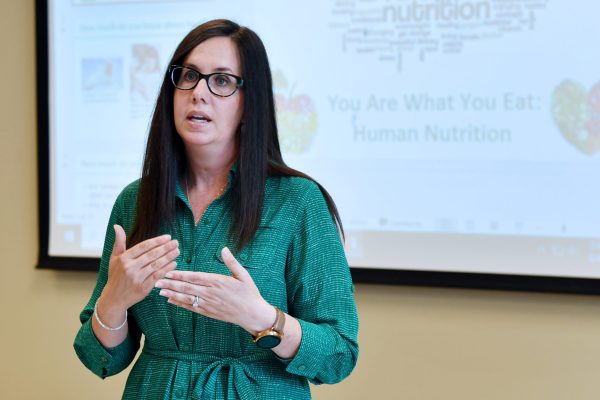Tonya Bates of Biological Sciences Receives Teaching Excellence Award

Tonya Bates, a senior lecturer in the Department of Biological Sciences, is the 2020 recipient of the UNC Charlotte Award for Teaching Excellence. She and Bank of America Award for Teaching Excellence recipient Heather Coffey of the Cato College of Education were honored during a virtual ceremony Thursday, Sept. 17.
Joining them were the other finalists for the two awards – all of whom are faculty in the College of Liberal Arts & Sciences (CLAS) – Paula Connolly, professor, English; Eric Heberlig, professor, Political Science and Public Administration; Susana Cisneros, senior lecturer, Languages and Culture Studies; and Kathleen Nicolaides, teaching professor, Criminal Justice and Criminology.
The recipients and finalists have common characteristics that set them apart.
“Their classrooms are places of inclusion where free expression of ideas is encouraged and welcomed, and where students of different backgrounds find acceptance,” said Provost Joan Lorden, as she introduced the six finalists. “They are creative. No matter what discipline they teach, they find new and inspiring methods to spark their students’ desire to learn and to grow.”
The University and its students also benefit from the excellent teaching of those with a range of titles like lecturer, clinical professor and teaching professor. The UNC Charlotte Teaching Excellence Award honors faculty members who have at least five years of teaching experience at UNC Charlotte. The Bank of America Award for Teaching Excellence, first presented in 1968, is given to a full-time, tenured faculty member with at least seven years of service to UNC Charlotte.
Bates, ’97 ’01 M.S., is a senior lecturer and a pioneer and leader within the Department of Biological Sciences in incorporating active learning, inquiry-based learning and technology in the classroom. Her courses, including high-enrollment, general education classes for non-majors, are strongly student-centered and focus on real-world applications and scientific literacy in an effort to better connect students with the material.
“Since 2010, I’ve taught biology to over 5,000 students,” Bates said. “Each of these students has provided an opportunity to reflect on why I do things the way I do, inside and outside of the classroom. Despite the large class size and barriers, my teaching remains student centered. It’s my goal to lead all my courses diversely so that students have multiple opportunities and avenues for grasping the material.”
By her adoption of a flipped classroom and other active learning approaches and by using learning assistants in large classes, her students benefit from opportunities to work collaboratively and to receive individual assistance. Instead of listening to lectures, students are engaged in low-stakes formative assessments.
“Active learning is something Tonya incorporated in her classroom long before we were all talking about it. She has worked tirelessly on re-designing Biology courses for majors and non-science majors and made these courses interactive and collaborative. Her outstanding teaching and her critical changes in our curriculum have led to better student learning outcomes in our department,” wrote Pinku Mukherjee, CLAS associate dean of research and graduate education, and former chair of the Department of Biological Sciences.
Bates, who received both bachelor’s and master’s degrees from UNC Charlotte, facilitates workshops for middle and high school science teachers, serves as a judge for K-12 science fairs, volunteers with the regional Science Olympiad competition, and serves on UNC Charlotte’s Science and Technology Expo planning committee. She also has extended her impact through training and mentoring University faculty.
Words: Aimee Hawkins